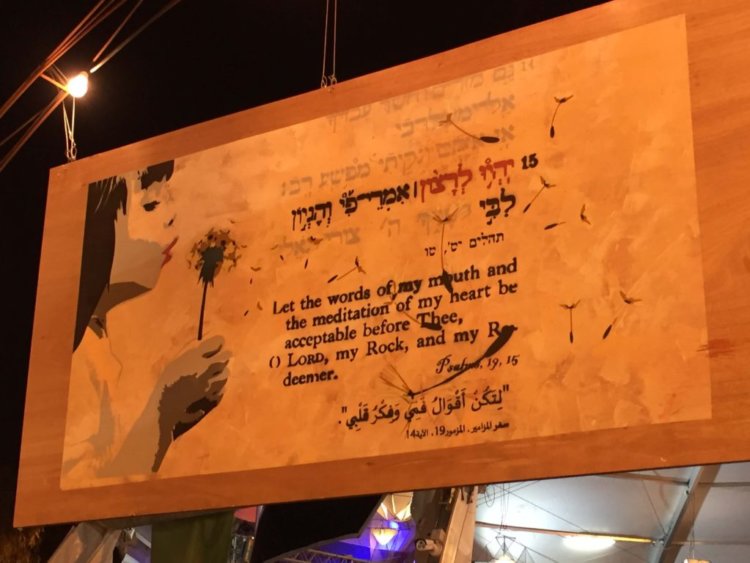
Last week, President Trump decided to officially recognize Jerusalem as the capital of Israel, and announced plans to move the US embassy from Tel Aviv to Jerusalem. Since then, a lot of people – including Jews, non-Jews and even members of my own family – have been asking me what this is all about. So what IS going on with Trump and Jerusalem?
Here’s what you need to know. (Later, I’ll share some thoughts about my experience with Jerusalem, my fears about this move and my hopes for what the future will bring.)
First, some context.
- When it comes to Middle East politics, things are very complicated and involve historical, contemporary, religious and political concerns and considerations. For Israeli and Palestinian residents of the region, every decision about Israel and the surrounding areas is intensely personal and complex.
- Jerusalem has always been a point of contention in the peace process. Israelis – and many Jewish people around the world – view it as the capital of both ancient and modern day Israel. And Palestinians – and many Muslim people around the world – view Jerusalem – especially east Jerusalem – as the eventual capital of the future Palestinian state.
- Jerusalem contains central significance to three world religions, and places holy to each. Christians come to Jerusalem to walk in the footsteps of Jesus on the Via Dolorosa and visit the churches of Jerusalem’s Christian Quarter. Muslims come to visit the al-Aqsa Mosque and the Dome of the Rock, where they believe the attempted sacrifice of Ishmael – and the Prophet Muhammad’s Night Journey to heaven – took place. And Jews have always held Jerusalem (the location of the Western Wall, the sole remnant of the destroyed Temple) as the eternal capital of the Jewish people.
Now, let’s tackle the current issue: Trump recognized Jerusalem as the capital of Israel and wants to move the embassy from Tel Aviv to Jerusalem. What’s up with that?
The Israeli government – the Knesset – operates out of Jerusalem. The Israeli Prime Minister and President both live in Jerusalem. And in 1995, the US Congress passed a law requiring the US to move the embassy from Tel Aviv to Jerusalem. But U.S. policy, during the tenures of Presidents Clinton, Bush and Obama, has always been to delay the move because of the potential security concerns. Out of respect for Palestinians and in an effort to avoid insulting Muslim parties involved with the peace process, the U.S. embassy has operated out of Tel Aviv. Trump recognizing Jerusalem as the capital is a serious break with past U.S. policy, and is being perceived as a negation of Palestinians’ dreams of Jerusalem as their future state’s capital.
Who is happy about Trump’s decision? Many of Trump’s supporters who are conservative and usually Republican Jews, and who believe that Jerusalem should only be a capital for Jews, are super thrilled right now. Many evangelical Christians, who tend to be conservative-leaning strong supporters of Israel, are also happy right now.
Who is not happy about this? Many people. People who support statehood and autonomy for the Palestinian people – or even those who do not support a two-state solution but understand how complicated the peace negotiations between the Palestinians and the Israelis are – understand that this move probably undermines the peace process more than it achieves in moving negotiations forward. Palestinians and Arabs the world over are protesting, with some calling for “days of rage” denouncing the move, and Hamas has even called for a third intifada (a violent uprising of Palestinians against the state of Israel).
What do I think? I have spent a lot of time in Israel – and in the West Bank – and I have family on both sides of the spectrum politically and religiously. I consider Israel my historical, spiritual, and religious homeland. To see it – and my Jewish community here in America – torn apart by such divisiveness is really upsetting. It’s especially upsetting for me to see liberal Jews being asked to choose between being liberals and being Zionists, as if the two are not compatible.
I know that there are organizations and political entities who believe Israel has no right to exist, who preach hatred for Jews and who weave propaganda into school books to teach children to fear and hate all Jews. I firmly oppose these organizations. But I also believe that the Palestinian people have a right to their capital and to the city too. There must be a way to protect the city and ensure access for all people who seek its holy places, regardless of faith or national identity.
I pray that Israel’s leaders find a way, and that American leaders and other leaders who are committed to Israel’s survival will partner in finding compromises that enable access to Jerusalem for all who seek her. I believe that the American spirit of inclusiveness, justice, and humanity will help us move forward from this latest policy shift to refocus on imparting those values in future conversations on this conflict.
I know that this issue is challenging and potentially volatile for many of you. But even if you disagree with me, it’s my hope that we can all engage in respectful conversation around this and other contentious subjects. Maybe mutual respect and understanding starts with us. Thanks for reading.
For more information:
- Why declaring Jerusalem the capital of Israel is so controversial (CNN)
- Opinion: Trump Has to Live with His Decision (CNN)
- Two-state solution (Wikipedia)
[Image: Sign at Jerusalem’s First Station pedestrian mall]




 Read More From Mayim
Read More From Mayim
Grok Nation Comment Policy
We welcome thoughtful, grokky comments—keep your negativity and spam to yourself. Please read our Comment Policy before commenting.